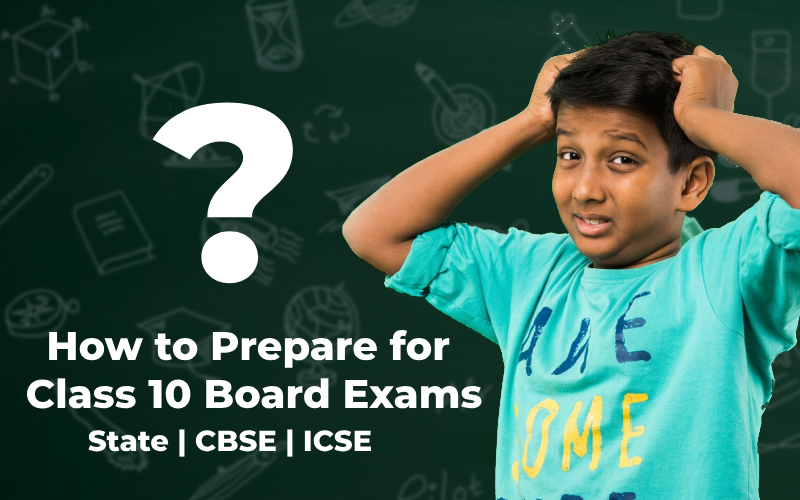Class 10 board exams are a crucial milestone in every student’s academic journey. Whether you’re studying under State Board, CBSE, or ICSE, a well-structured study plan can make all the difference in scoring high marks. This guide provides a subject-wise study plan with effective preparation tips to help you excel in your board exams.
General Preparation Tips for Class 10 Board Exams
✅ Know Your Syllabus – Go through the official syllabus of your board (State, CBSE, or ICSE) and focus on important topics.
✅ Make a Study Timetable – Allocate at least 6-8 hours daily for focused study and revisions.
✅ Practice Previous Year Question Papers – Solve last 5-10 years’ board exam papers to understand the exam pattern.
✅ Stay Consistent – Avoid last-minute cramming; study regularly and revise weekly.
✅ Take Notes – Write down key concepts, formulas, and important dates for quick revision.
✅ Stay Healthy – Get enough sleep, eat nutritious food, and take breaks to stay focused.
Now, let’s break it down subject-wise for State Board, CBSE, and ICSE students
1. Mathematics: Master the Concepts with Practice
📌 Key Focus Areas: Algebra, Geometry, Trigonometry, Mensuration, Statistics, and Probability.
📝 Study Strategy:
✔ Understand theorems, formulas, and concepts instead of memorizing them.
✔ Solve at least 10 problems daily from different topics.
✔ Practice previous year’s board exam questions, as many problems get repeated.
✔ Time yourself while solving sample papers to improve speed and accuracy.
🔹 Tip for CBSE & ICSE: Focus on application-based and HOTS (Higher Order Thinking Skills) questions.
🔹 Tip for State Board: Concentrate on textbook problems, as most questions come from the syllabus.
2. Science: Conceptual Clarity is the Key
📌 Key Focus Areas: Physics (Electricity, Light, Magnetism), Chemistry (Acids, Bases, Chemical Reactions), Biology (Human Anatomy, Genetics, Environment).
📝 Study Strategy:
✔ Read NCERT or prescribed textbooks thoroughly, as questions are often directly picked from them.
✔ Make concept maps and flowcharts for Biology to understand processes.
✔ For Physics and Chemistry, memorize formulas and chemical equations through regular practice.
✔ Perform practical-based learning—review lab experiments and diagrams.
🔹 Tip for CBSE & ICSE: Expect application-based questions, so practice conceptual reasoning.
🔹 Tip for State Board: Focus on textbook theory and labeling diagrams to score well.
3. English: Improve Grammar & Writing Skills
📌 Key Focus Areas: Literature (Poems, Stories), Grammar, Essay Writing, Letter Writing.
📝 Study Strategy:
✔ Read all chapters carefully and make summaries of stories and poems.
✔ Learn important quotes and literary devices (for ICSE students).
✔ Improve grammar skills by practicing error correction, sentence formation, and comprehension exercises.
✔ Practice writing essays and letters, as they hold significant weightage in exams.
🔹 Tip for CBSE & ICSE: Focus on unseen passages, as comprehension skills are tested.
🔹 Tip for State Board: Stick to textbook exercises, as exam questions are often direct.
4. Social Science: Smart Learning with Dates & Events
📌 Key Focus Areas: History (Important Events, Freedom Struggle), Geography (Maps, Climate), Civics (Constitution, Democracy), Economics (Development, Sectors of Economy).
📝 Study Strategy:
✔ Break down long chapters into short notes and timelines for easy memorization.
✔ Highlight important dates, events, and names.
✔ For Geography, practice map pointing regularly.
✔ Solve previous year question papers to understand question trends.
🔹 Tip for CBSE & ICSE: Expect application-based questions, so write answers in points with proper reasoning.
🔹 Tip for State Board: Focus on textbook answers, as direct questions are common.
5. Hindi & Other Languages: Score Well with Practice
📌 Key Focus Areas: Literature, Grammar, Essay Writing, Letter Writing.
📝 Study Strategy:
✔ Read all poems and stories carefully and prepare short summaries.
✔ Focus on grammar rules, as they carry high marks.
✔ Practice writing essays and letters based on previous year question papers.
✔ Memorize important proverbs, idioms, and word meanings to enhance vocabulary.
🔹 Tip for CBSE & ICSE: Pay attention to creative writing sections, as they test your expression and grammar.
🔹 Tip for State Board: Stick to prescribed textbook exercises for literature and grammar.
Last-Minute Revision Tips
📌 One Month Before Exams:
✔ Focus on solving full-length mock tests under exam conditions.
✔ Revise important formulas, dates, and key points every day.
✔ Work on your weak subjects first, then review strong subjects.
📌 One Week Before Exams:
✔ Avoid learning new topics; focus only on revision and solving question papers.
✔ Sleep well and keep a positive mindset.
📌 Exam Day Strategy:
✔ Read the question paper carefully before answering.
✔ Attempt easy questions first to build confidence.
✔ Write answers neatly and underline key points.
✔ Manage your time effectively—don’t spend too long on one question.
Conclusion
Success in Class 10 board exams depends on discipline, consistent revision, and smart study techniques. Whether you are following the State Board, CBSE, or ICSE, using this subject-wise approach can help you prepare effectively and score high marks.
At Ideal Centre, Jayanagar, we provide expert coaching for Class 10 students (State Board, CBSE, ICSE) to ensure concept clarity, strong problem-solving skills, and board exam success.
📞 Call us today to enroll and get the best guidance for your board exams!



